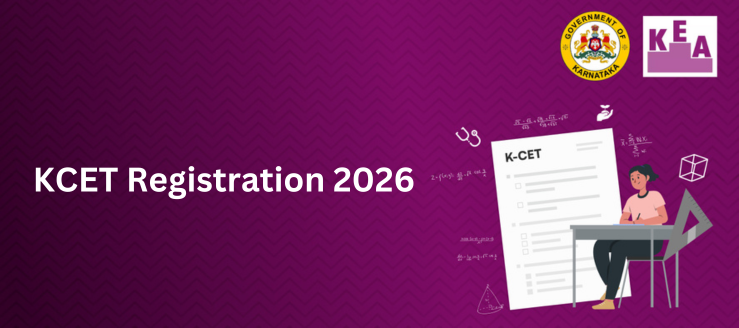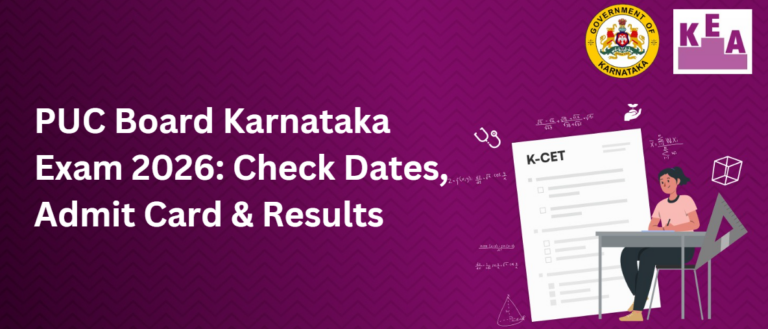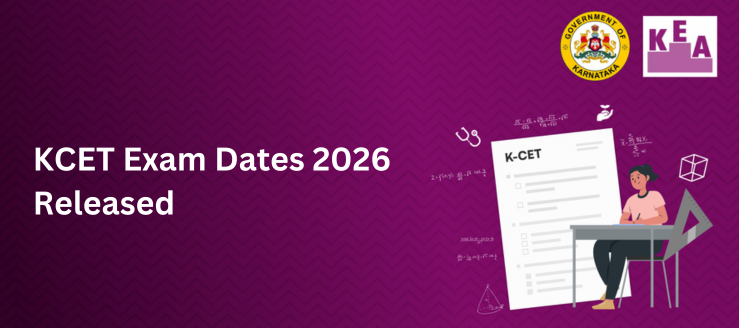Summarise With AI
The Karnataka Common Entrance Test (KCET) 2025 will be conducted on the 16th and 17th April 2025. The Kannada Language Test will be conducted on the 18th of April 2025. As the exam date is near, the students must focus on completing the entire syllabus. The important topics in each subject can help the students achieve the maximum score in the KCET exam 2025.
The Karnataka Common Entrance Test (KCET) is a state-level entrance examination conducted by the Karnataka Examinations Authority (KEA) once a year. This test acts as a gateway for the students entering into the undergraduate courses offered by the various institutions or colleges across the state.
KCET Important Topics:
Knowing the important topics for every subject will help the students score the maximum marks in the KCET 2025 examination. The main topics from every subject are as follows:
Physics Important Topics:
The candidates can first focus on Physics due to its importance and weightage and the candidates can complete the syllabus in a short time comparatively.
Here are some important topics in Physics:
- Motion in a Plane
- Work, Power, and Energy
- Moving Charges and Magnetism
- Rotational Motion
- Current Electricity
- Dual Nature of Radiation and Matter
- Alternating Current
- Semi-Conductor Electronics
Chemistry Important Topics
After completing Physics, the candidate can go for Chemistry. In the preference order, chemistry has the weightage after physics compared to Mathematics.
Here are some important topics in Chemistry:
- Chemical Bonding and Molecular Structure
- Alcohols, Phenols, and Ethers
- d & f – block elements
- Electrochemistry
- Chemical Kinetics
- Aldehydes, Ketones, and Carboxylic Acids
- Organic Chemistry – some basic principles and techniques
- Coordination Compounds
- Biomolecules
Also Checkout: KCET Rank Predictor
Mathematics Important Topics
After completing Physics and Chemistry, the candidates can choose mathematics. The preparation for Mathematics requires a lot of time compared to Physics and Chemistry.
Here are some important topics in Mathematics:
- Continuity and Differentiability
- Integrals
- Application of Derivatives
- Trigonometric Functions
- Limits and Derivatives
- Vector Algebra
- Three Dimensional Geometry
- Probability
- Matrices
- Determinants
Biology Important Topics:
- Neural Control and Co-ordination
- Photosynthesis in Higher Plants
- Respiration in Plants
- Human Reproduction
- Ecosystem
- Biotech: Principles and Processes
- Biomolecules
- Plant Kingdom
Chapter Wise Weightage
Chapter Wise weightage is given based on both the 11th and 12th classes. The medium of the questions given in the KCET 2025 will be from easy to hard. The detailed information is given below:
- From the Syllabus of Class 11 – 15 to 20 questions from each subject.
- From the Syllabus of Class 12 – 40 to 45 questions from each subject.
- The number of easy questions – around 30 to 35 questions
- The number of questions in a medium-level difficulty – 15 to 20 questions
- The number of difficult questions – 5 to 10 questions
Physics Chapter Wise Weightage
| Chapter | Weightage |
|---|---|
| PUC 1 | |
| Motion in a Plane | 2 Questions |
| Work, Power & Energy | 2 Questions |
| Rotational Motion | 2 Questions |
| Thermodynamics and Kinetic Theory | 2 Questions |
| Physical world | 1 Question |
| Units and Measurements | 1 Question |
| Motion in a Straight Line | 1 Question |
| Laws of Motion | 1 Question |
| Gravitation | 1 Question |
| Mechanical Properties of Fluids | 1 Question |
| Mechanical Properties of Solids | 1 Question |
| Thermal Properties of Matter | 1 Question |
| Oscillations | 1 Question |
| Waves | 1 Question |
| PUC 2 | |
| Current Electricity | 5 Questions |
| Moving Charges and Magnetism | 5 Questions |
| Alternating Current | 4 Questions |
| Ray Optics and Optical Instruments | 4 Questions |
| Wave Optics | 3 Questions |
| Dual Nature of Radiation and Matter | 3 Questions |
| Semiconductor Electronics | 3 Questions |
| Electric Charges and Fields | 3 Questions |
| Electrostatic Potential and Capacitance | 3 Questions |
| Magnetism and Matter | 2 Questions |
| Electromagnetic Induction | 2 Questions |
| Atoms | 2 Questions |
| Nuclei | 2 Questions |
| Electromagnetic Waves | 1 Question |
| Communication Systems | 1 Question |
Also Checkout: KCET Rank Predictor
Chemistry Chapter Wise Weightage
| Chapter | Weightage |
| PUC 1 | |
| Chemical Bonding and Molecular Structure | 3 Questions |
| Equilibrium | 2 Questions |
| Hydrocarbons | 2 Questions |
| Organic Chemistry – Some Basic Principles and Techniques | 2 Questions |
| Basic Concepts of Chemistry | 1 Question |
| Structure of Atom | 1 Question |
| Classification of Elements in Periodicity in Properties | 1 Question |
| States of Matter | 1 Question |
| Thermodynamics | 1 Question |
| Redox Reactions | 1 Question |
| Hydrogen | 1 Question |
| S – block elements | 1 Question |
| PUC 2 | |
| Alcohols, Phenols and Ethers | 5 Questions |
| Solutions | 4 Questions |
| ElectroChemistry | 4 Questions |
| Chemical Kinetics | 4 Questions |
| d & f – block elements | 4 Questions |
| Aldehydes, Ketones and Carboxylic Acids | 4 Questions |
| Organic Compounds Containing Nitrogen | 4 Questions |
| Biomolecules | 4 Questions |
| Haloalkanes and Haloarenes | 4 Questions |
| Coordination Compounds | 3 Questions |
Mathematics Chapter Wise Weightage
| Chapter | Weightage |
| PUC 1 | |
| Trigonometric Functions | 2 Questions |
| Limits and Derivatives | 2 Questions |
| Sets | 1 Question |
| Relations and Functions | 1 Question |
| Complex Numbers and Quadratic Equations | 1 Question |
| Linear Inequalities | 1 Question |
| Permutations and Combinations | 1 Question |
| Binomial Theorem | 1 Question |
| Sequence and Series | 1 Question |
| Straight Lines | 1 Question |
| Conic Sections | 1 Question |
| Introduction to 3D Geometry | 1 Question |
| Statistics | 1 Question |
| Probability | 1 Question |
| PUC 2 | |
| Continuity and Differentiability | 6 Questions |
| Integrals | 6 Questions |
| Application of Derivatives | 4 Questions |
| Vector Algebra | 4 Questions |
| Three Dimensional Geometry | 4 Questions |
| Probability | 3 Questions |
| Relations and Functions | 3 Questions |
| Matrices | 3 Questions |
| Determinants | 3 Questions |
| Application of Integrals | 2 Questions |
| Differential Equations | 2 Questions |
| Inverse Trigonometric Functions | 2 Questions |
| Linear Programming | 1 Question |







